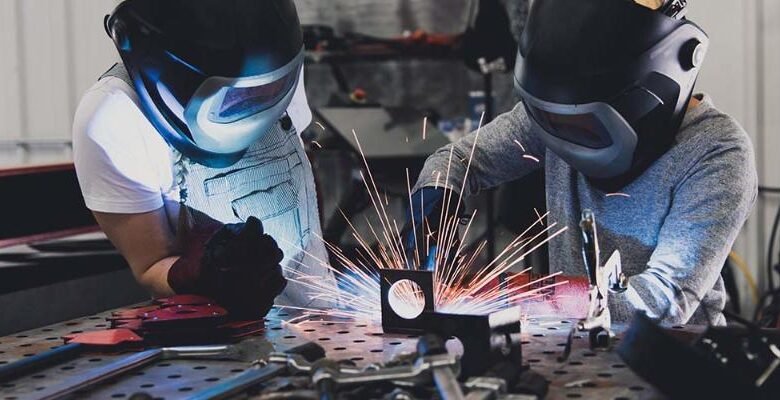High Paying Welding Careers – A fully detailed guide 2025

Welding is a skill that combines technical expertise and creativity. Welders join metal parts together using specialized equipment, and their work is essential in industries such as construction, manufacturing, automotive, and aerospace. While many people associate welding with manual labor, it can lead to high-paying careers for those who are skilled and dedicated. In this article, we’ll explore various welding careers that offer excellent earning potential.
Why Welding is a Lucrative Career
Welding is in high demand worldwide. From building skyscrapers to repairing ships, skilled welders are needed for a wide range of projects. Some reasons why welding careers are lucrative include:
- High Demand: Industries like construction, oil and gas, and aerospace always need welders.
- Specialized Skills: Certain welding techniques require advanced training and certification, making these welders highly sought after.
- Global Opportunities: Welders can work almost anywhere in the world.
- Overtime Pay: Many welding jobs offer overtime, significantly boosting income.
Top High-Paying Welding Careers
1. Underwater Welder
- Salary Range: $55,000 – $200,000 per year
- Job Description: Underwater welders perform welding tasks underwater, often for oil rigs, pipelines, and ship repairs.
- Requirements:
- Certification in commercial diving.
- Training in underwater welding techniques.
- Strong swimming and safety skills.
- Why It Pays Well: The combination of technical welding skills and the challenges of working underwater makes this job highly lucrative.
2. Pipeline Welder
- Salary Range: $70,000 – $120,000 per year
- Job Description: Pipeline welders join and repair pipelines that transport oil, gas, and water.
- Requirements:
- Certification in pipeline welding.
- Willingness to travel to remote locations.
- Why It Pays Well: The job’s complexity and the need to work in harsh environments make pipeline welders well-compensated.
3. Certified Welding Inspector (CWI)
- Salary Range: $70,000 – $100,000 per year
- Job Description: CWIs inspect and ensure the quality of welding projects, ensuring they meet safety and industry standards.
- Requirements:
- CWI certification from the American Welding Society (AWS).
- Extensive welding experience.
- Why It Pays Well: Inspectors are responsible for maintaining safety and quality, which is critical in large-scale projects.
4. Aerospace Welder
- Salary Range: $50,000 – $100,000 per year
- Job Description: Aerospace welders work on aircraft and spacecraft, using precise techniques to join lightweight materials.
- Requirements:
- Specialized training in aerospace welding.
- High-level certifications in TIG and MIG welding.
- Why It Pays Well: Precision and skill are paramount, as any error could lead to safety issues.
5. Military Support Welder
- Salary Range: $40,000 – $100,000 per year
- Job Description: Military support welders repair and fabricate equipment for the armed forces.
- Requirements:
- Military welding certification.
- Ability to work in challenging environments.
- Why It Pays Well: The job often involves high-stress environments and specialized skills.
6. Nuclear Industry Welder
- Salary Range: $60,000 – $120,000 per year
- Job Description: Welders in the nuclear industry work on reactors, pipes, and other critical components.
- Requirements:
- Certification in nuclear welding techniques.
- Extensive safety training.
- Why It Pays Well: The nuclear industry demands precision and has strict safety standards, justifying high wages.
7. Industrial Shutdown Welder
- Salary Range: $50,000 – $150,000 per year
- Job Description: Shutdown welders repair and maintain equipment during factory or plant shutdowns.
- Requirements:
- Flexibility to work irregular hours.
- Certification in various welding techniques.
- Why It Pays Well: Tight deadlines and demanding work environments make this a high-paying job.
Skills and Certifications Needed
To excel in these high-paying careers, welders need specific skills and certifications, such as:
- Basic Welding Certifications: Provided by organizations like AWS or ASME.
- Specialized Training: In techniques like TIG, MIG, and stick welding.
- Soft Skills: Attention to detail, problem-solving, and communication skills.
- Physical Fitness: The ability to work in challenging environments.
- Safety Training: Understanding of safety protocols and hazard management.
Tips to Get Started in High-Paying Welding Careers
- Invest in Training: Enroll in a reputable welding school or apprenticeship program.
- Get Certified: Obtain certifications relevant to your desired field.
- Gain Experience: Start with entry-level positions to build your skills and resume.
- Network: Connect with industry professionals and join welding associations.
- Be Willing to Relocate: High-paying jobs are often in remote or specialized locations.
Conclusion
Welding offers diverse career paths with excellent earning potential. Whether you’re interested in working underwater, inspecting welds, or contributing to aerospace innovation, there’s a lucrative opportunity waiting for you. With the right training, certifications, and dedication, you can build a rewarding career in this in-demand field.



